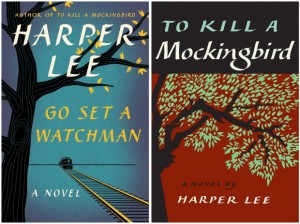
Harper Lee’s To Kill a Mockingbird influenced me greatly as a young reader. While Atticus was the hero of that book, I identified with young Scout, a tomboy (as I was) who revered her father (as I revered my own.) The book gave me a different perspective of racial inequality and injustice, but more than that, it was a story of the coming-of-age of a white girl in the deep South, raised by Atticus, her principled father and Calpurnia, his housekeeper/cook/nanny. I saw her insular town in Maycomb County, Alabama, through her eyes and learned of Southern manners, respect, ignorance, prejudice, bigotry, hypocrisy, incest and rape through her eyes – which is to say, through the author’s eyes. The fact that the story was told by a white girl does not diminish its importance. In fact, white people were instrumental in African Americans gaining their rights. Some of those white people were women.
Had Go Set a Watchman been published it would have set the world on its ear, back in 1960, less than a decade after Brown vs Board of Education and eight years before Martin Luther King Jr. was assassinated. It was radical for its time – too radical.
Go Set a Watchman was written before Lee’s Pulitzer Prize winning “first novel” and was rejected. To me, it is a much more honest book, more straightforward, less crafted. From a writer’s point of view, it shows signs of being an early work, particularly the second half when Scout tends toward diatribes. Some reviewers have called it “flawed.” Of course it’s flawed, as are most books, particularly first books.
The art of writing — the craft of writing — is a process. Books don’t just spring perfectly formed, from a writer’s forehead. Stories have a way of morphing themselves and in fiction, even more so. A story – the same story – can be told from many different viewpoints. Stories are our parallel lives. They are all happening simultaneously, they are all true.
The best fiction isn’t about issues; the best fiction is about individuals. In telling one person’s story you tell a vital part of the human experience. Harper Lee allows Scout to do a little too much preaching in To Set a Watchman, but it does reveal the main character’s passionate idealism, which was ahead of its time. Harper Lee was at the vanguard of the great era of social change the sixties would bring.
On one level Go Set a Watchman is the story of a young woman’s separation from her father. Everyone sees the obvious racial theme but who’s talking about the other underlying theme?
In 2015, feminism is dead — or at least in a deep coma. In another version of the same story (Go set a watchman to kill a mockingbird ) an older Jean Louise returns home from New York — not a perfect place but a place where she has become an independent person. She comes back to the home she loves and the father she respects and she finds that he – and her boyfriend, the man who expects to marry her – are not the men she thought they were. She is ashamed of them. This is a theme not often explored in literature – daughter against father, daughter separating to become her own person, and turning down marriage in the process.
Had Go Set a Watchman been published it would have set the world on its ear, back in 1960, less than a decade after Brown vs Board of Education and eight years before Martin Luther King Jr. was assassinated. It was ahead of its time.
Still, it’s greatest value to me, is the story of a young woman coming of age whose father has greatly disappointed her. Atticus is a man of his time. He’s not evil, he’s just a man, as is Hank, whose hand she refuses. Scout is her own woman and is guided by her own watchman. Scout is the hero of Go Set a Watchman, not Atticus. Apparently a lot of people were disappointed in that. I for one, thought it was an honest novel, with an autobiographical ring of truth that first novels often have. There are infinite ways this story could be written. Maybe someone can write it from Calpurnia’s point of view.